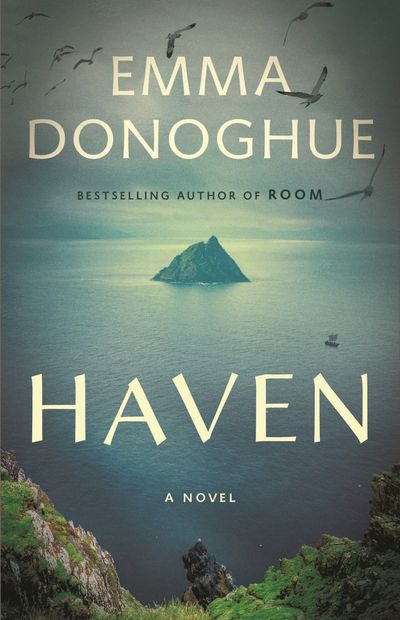Book review: In Emma Donoghue’s ‘Haven,’ the drama accumulates slowly

Last year’s most unlikely bestseller was “Matrix,” a novel by Lauren Groff about an obscure medieval poet named Marie de France and a 12th-century nunnery. Maybe two years of COVID seclusion had primed us for a story of monastic adventure, and certainly Groff’s rich style helped the book sing to many readers. But in addition to her enormous fan base – which includes Barack Obama – the novel succeeded because it eschewed fusty Christian theology and projected modern feminist ideals onto its ancient canvas.
Now comes Emma Donoghue, another popular and critically acclaimed novelist, with “Haven,” a monastic story of her own. But Donoghue has ratcheted up the stakes by taking on a trifecta of bestseller killers: First, she moves the clock back even further, to around A.D. 600. Second, she portrays a culture inhabited only by men. And third, her characters live and move and have their being in an atmosphere fully imbued with their primitive Christian faith.
In short, few readers have been praying for a novel like this. But “Haven” creates an eerie, meditative atmosphere that should resonate with anyone willing to think deeply about the blessings and costs of devoting one’s life to a transcendent cause.
The novel opens with a kind of preface set at Cluain Mhic Nóis, a relatively new monastery with about three dozen monks in the center of Ireland. Not 200 years have passed since St. Patrick converted the island to Christianity, but that’s more than enough time for this religious community to have lost some of its savor and fallen into a comfortable routine.
That, at least, is the critical opinion held by Artt, a legendary holy man, a living saint, who has dropped by while “carrying the light of the Gospel.” Artt speaks many languages and knows the paths of the stars. It’s rumored that he’s read every book written – admittedly easier back in A.D. 600, but still! Most impressive of all, he’s survived the plague with just a slight abbreviation of one little finger.
During his visit at Cluain Mhic Nóis, Artt makes few complaints about the abbot’s lax management, but everything about his abstemious manner suggests how disappointed he is. Which makes Artt’s announcement all the more remarkable: He has had a divinely inspired dream, a vision of an island in the western sea. He tells the astonished abbot that he intends to find that island and establish a new monastery, a haven far from the sins of the world. And, these being God’s inscrutable instructions, he must take only two companions, an old monk and a young one.
Artt quickly selects Cormac, “a hunched fellow” with bad eyesight who never tires of telling stories, and Trian, a shy daydreamer who was handed over to the monastery at the age of 13. Modest as their lives have been , what they’re about to experience is orders of magnitude more strenuous. “Ours will be a sacred wandering,” Artt tells them. Cormac and Trian are thrilled – for a time – by the boundless generosity of God.
Sailing off the southwestern coast of Ireland in an impossibly precarious boat, this curious trio spots a large rock, “a great blank page,” covered in birds, guano and little else. Here, despite Cormac’s deep skepticism, Artt decides they will spend the rest of their lives “waging war on the devil with pen and ink.” (In an author’s note, Donoghue says she imagines her story taking place on Skellig Michael, which she’s never visited but knows, like millions of others, as Luke Skywalker’s hideaway in “The Force Awakens” and “The Last Jedi.”)
Artt, Cormac and Trian endure hardships, of course, but not really adventures. The drama of this novel accumulates slowly, like the fresh water in their cistern. The challenges – what to eat, where to sleep – are exacerbated by Artt’s fanatical insistence that they immediately build a stone church and begin copying Bibles. The result is a story of survival trapped in a small space, completely cut off from the world: “Room” with a view.
Donoghue works subtly in the margins, letting these three men evolve into their distinct roles. Their foolish destruction of the island’s resources will resonate with contemporary readers, but she refuses to reduce these characters to symbols of modern exigencies. Her narration stays close to their minds, which are about as free of sin as this story is of irony. Artt, Cormac and Trian think and speak in the tropes of the Bible. They remain very much creatures of their distant era, their understanding of the world and their place in it entirely theological.
The effect is transporting, sometimes unsettling and eventually shocking. Trian’s affection for his companions, the birds, the island – everything – is so sweet and vulnerable that tragedy starts to haunt these pages like the coming winter. And as a leader, Artt is not nearly as competent as he imagines. His determination to create a sanctuary on this God-blessed rock looks increasingly dubious. To practical, old Cormac, the whole scheme begins to feel downright suicidal.
My only substantial criticism of “Haven” sounds more harsh than I mean it to: This novel could have been a classic short story. Donoghue’s prose is too attentive to the craggy beauty of the island and the flutterings of Trian’s heart to suggest the book is padded. But the story’s tight focus; its single, steadily rising arc; and especially its walloping conclusion would have ensured a short-story version “Haven” the kind of immortality that Artt can only dream about.